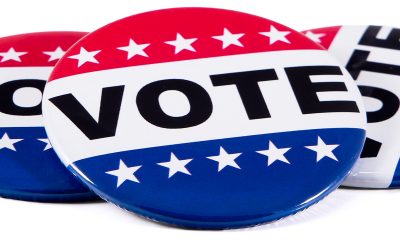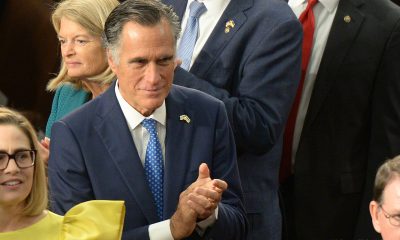National
Super Tuesday could bring more confusion to GOP race
High stakes as 437 delegates up for grabs next week

The winding road of the Republican presidential primary race continues next week as GOP voters in 10 states weigh in on who should be their standard-bearer heading into November.
A strong showing by any GOP candidate on Super Tuesday — when 437 delegates are up for grabs — could push someone from the race.
If former Massachusetts Gov. Mitt Romney, who regained his position as front-runner after wins in Arizona and Michigan this week, does well in the contests, it could mean the end of the game for one or more of his remaining opponents: former U.S. Sen. Rick Santorum, former U.S. House Speaker Newt Gingrich and Rep. Ron Paul (R-Texas).
The states holding contests on Super Tuesday are: Alaska, Georgia, Idaho, Massachusetts, North Dakota, Ohio, Oklahoma, Tennessee, Vermont and Virginia.
Super Tuesday comes on the heels of another important contest on Saturday: the Washington State caucuses, where 43 delegates are in play. On Tuesday, Wyoming will also begin its caucuses, but that process will continue throughout the week and the results won’t be known until Saturday.
But it appears that Super Tuesday will not be a cakewalk for Romney, after he only eked out a three-point win over Santorum in his home state of Michigan.
Dan Pinello, who’s gay and a government professor at the City University of New York, said he thinks the outcome of the contests will be “muddled” and won’t leave a clear Republican front-runner in their aftermath.
“It’s going to be a mix of wins by various candidates,” Pinello said. “I don’t think the field is going to be any clearer after Tuesday than it is before, quite frankly. I anticipate that all four candidates will also continue regardless of what happens on Tuesday.”
Hastings Wyman, who’s also gay and editor of the Southern Political Report, said Santorum may continue to show strength in several southern states.
“I think he has a good shot in Oklahoma, possibly in Tennessee, possibly in Georgia,” Wyman said. “The only one I would give him a good shot in is probably Oklahoma.”
In Ohio, Santorum could show that his campaign continues to have life. According to a poll published Tuesday by the University of Cincinnati, Santorum leads Romney by 11 percentage points among Republican primary voters.
Wyman said the race in Georgia is important for Gingrich because if he doesn’t win there, which is his home state, it will likely be the end of his campaign.
“It’s very hard to predict what he’ll do, but I think it’ll be very hard from him to stay in if he doesn’t carry Georgia,” Wyman said. “He’s working very hard down there. He’s touring the state, he’s speaking to these mega churches, he’s treating it like Romney was treating Michigan.”
Gingrich seems poised to capture the state. A poll published Monday by Survey USA found him leading there with 39 percent of support among Republican voters. Santorum follows at 24 percent, while Romney comes in at 23 percent.
The contest in Virginia will also be of special interest because it’s awarding a large number of delegates, 46, and because only two candidates will be on the ballot: Romney and Paul.
Wyman said Republicans unhappy with Romney may vote for Paul in an effort to prolong the Republican primary season and prevent Romney from claiming the nomination. Virginia has an open primary, which means Democrats can come to the polls.
“It would not surprise me if a lot of the people who vote for Santorum or Gingrich would get out the vote for Paul just to slow down Romney,” Wyman said.
David Lampo, a gay Republican activist from Alexandria, Va., said he’s voting for Paul in the primary not as a protest vote, but because of the candidate’s libertarian views.
“I’m a longtime libertarian, so of course he appeals to me,” Lampo said. “Not the greatest messenger, but he has reintroduced libertarianism to millions of Americans, particularly a whole new generation of young voters. And he even runs competitively with President Obama in many polls.”
As a U.S. House member, Paul was among the Republicans who voted for “Don’t Ask, Don’t Tell” repeal and against a U.S. constitutional amendment banning same-sex marriage, but the candidate has also been a strong supporter of the Defense of Marriage Act.
Lampo said Paul has been “a bit uneven” on LGBT issues, but “shines” compared to the other Republican presidential candidates.
CUNY’s Pinello said Paul may have “a few good showings” in Super Tuesday, but expressed doubt the candidate would be able to prevail in any states next week.
“I don’t know that he’ll win any states, but he will have good enough showings to argue that his effort isn’t necessarily doomed, at least from his perspective,” Pinello said. “His supporters are so gung-ho that it doesn’t really make a difference that he hasn’t won any states outright.”
Even if Romney builds off his wins in Michigan and Arizona by sweeping the contests on Super Tuesday, whether Santorum or Gingrich will drop out immediately remains unclear.
Wyman said the Romney alternatives may see if they can win a brokered convention when Republicans gather in Tampa later this year to anoint their nominee.
In that case, delegates wouldn’t be able to settle on a nominee during the ballot round and would have to negotiate through political horse-trading to settle on a candidate.
“If they can all stay in and keep their delegates at least on the first ballot — I think most states require that — then they might possibly be able to keep Romney from winning on the first ballot and maybe create some opportunity for somebody else,” Wyman said.
Pinello said the prospects of a brokered convention in Tampa are diminished now that Romney has pulled off a win — albeit a narrow one — in his home state of Michigan this week, but such an outcome could still be possible.
“If the current polling data nationally show that Obama has a lead, although not large, but nonetheless a lead, over all four of the current Republican candidates,” Pinello said. “So the party leadership across the nation that may be wishing for a Jeb Bush or a Chris Christie or someone else be their champion and save the day, but I don’t think that’s likely at all.”
Whether the GOP candidates will draw on anti-gay rhetoric to win support from Republican voters prior to Super Tuesday also remains to be seen.
Wyman said “you might see some” campaigning directed against the LGBT community in the Super Tuesday states as the candidates jockey for support among conservative voters.
“They’ve all been pretty stalwart in their opposition to anything gay,” Wyman said. “Every now and then one of them will act a little bit liberal and say, ‘I don’t believe in discrimination,’ but they do. Ultimately, they side with the religious right on most gay issues.”
Pinello expressed doubt that Romney would draw on anti-gay attacks, saying the candidate would instead opt to focus on economic issues, but couldn’t say the same about Santorum.
“He had that confrontation before the New Hampshire with college students over same-sex marriage,” Pinello said. “A lot of commentators said that had been a mistake by him in terms of allowing the issue to drift away from economic issues, but he doesn’t seem concerned by that. He’s happy to be the stalwart on social issues.”
Pinello said if the candidates want to talk about social issues, the would be more inclined hot button topics other than LGBT rights, such as a abortion and the Obama administration’s rule providing contraception to women.
The candidates’ positions on LGBT issues are already well-known. Each of the Republican candidates who’ve won primaries — Romney, Santorum and Gingrich — has signed a pledge from the National Organization for Marriage vowing to back a Federal Marriage Amendment, defend the Defense of Marriage Act in court and establish a commission on “religious liberty” to investigate the harassment of same-sex marriage supporters.
Santorum has gone further by saying he’d restore “Don’t Ask, Don’t Tell” if elected president, and Gingrich has said he’d order an “extensive review” of going back to the policy.
As candidates campaign in Tennessee, they may want to weigh in on state pending legislation commonly known as the “Don’t Say Gay” bill, which would prohibit discussion about homosexuality in schools from kindergarten through eighth grade.
Chris Sanders, chair of the Nashville Committee for the Tennessee Equality Project, said polls are showing Santorum has strength in Tennessee and his views are in synch with what’s happening in the legislature.
“Given the fact that he has been so explicitly anti-equality, it’s just another index that we’ve got a lot of work to do in Tennessee,” Sanders said.
Sanders dismissed the idea that Santorum or other candidates would explicitly mention state legislative issues, such as the “Don’t Say Gay Bill,” but said “the anti-equality candidates will find very hospitable ground for themselves here.”
The Washington State caucuses on Saturday could also draw anti-gay sentiments from the candidates because Gov. Chris Gregoire earlier this month signed marriage equality into law, and anti-gay forces are at work to collect the 120,577 signatures needed by June 6 to put the law before voters in November.
Santorum made his opposition to the marriage law a cornerstone of his campaign in Washington State. On the same day the marriage law was signed, Santorum held a campaign rally in the state, saying Gregoire’s signature “isn’t the last word” on marriage as he called on supporters to bring the measure to the polls.
For his part, Gingrich took a softer approach to Washington — as well as the expected legalization of same-sex marriage in Maryland — by saying last week these states were going about it “the right way” by using the legislative process instead of the courts, even though he personally opposes same-sex marriage.
“I think at least they’re doing it the right way, which is going through voters, giving them a chance to vote and not having a handful of judges arbitrarily impose their will,” Gingrich said.
The candidate’s statement contradicts his support for a Federal Marriage Amendment, which, if passed, would abrogate all laws allowing same-sex marriage, including those passed by state legislatures.
Romney has yet to address specifically the legalization of same-sex marriage in Washington, but Pinello doubted the candidate will talk about the issue ahead of Saturday.
“He is really trying to focus on economic issues, single-mindedly,” Pinello said. “I don’t think he would initiate any conversation. He can’t necessarily avoid a question that might come up if one were posed, but I’m sure it will be a short answer, and then he’d jump back to some economic issue.”
Federal Government
Lambda Legal praises Biden-Harris administration’s finalized Title IX regulations
New rules to take effect Aug. 1

The Biden-Harris administration’s revised Title IX policy “protects LGBTQ+ students from discrimination and other abuse,” Lambda Legal said in a statement praising the U.S. Department of Education’s issuance of the final rule on Friday.
Slated to take effect on Aug. 1, the new regulations constitute an expansion of the 1972 Title IX civil rights law, which prohibits sex-based discrimination in education programs that receive federal funding.
Pursuant to the U.S. Supreme Court’s ruling in the landmark 2020 Bostock v. Clayton County case, the department’s revised policy clarifies that discrimination on the basis of sexual orientation and gender identity constitutes sex-based discrimination as defined under the law.
“These regulations make it crystal clear that everyone can access schools that are safe, welcoming and that respect their rights,” Education Secretary Miguel Cardona said during a call with reporters on Thursday.
While the new rule does not provide guidance on whether schools must allow transgender students to play on sports teams corresponding with their gender identity to comply with Title IX, the question is addressed in a separate rule proposed by the agency in April.
The administration’s new policy also reverses some Trump-era Title IX rules governing how schools must respond to reports of sexual harassment and sexual assault, which were widely seen as imbalanced in favor of the accused.
Jennifer Klein, the director of the White House Gender Policy Council, said during Thursday’s call that the department sought to strike a balance with respect to these issues, “reaffirming our longstanding commitment to fundamental fairness.”
“We applaud the Biden administration’s action to rescind the legally unsound, cruel, and dangerous sexual harassment and assault rule of the previous administration,” Lambda Legal Nonbinary and Transgender Rights Project Director Sasha Buchert said in the group’s statement on Friday.
“Today’s rule instead appropriately underscores that Title IX’s civil rights protections clearly cover LGBTQ+ students, as well as survivors and pregnant and parenting students across race and gender identity,” she said. “Schools must be places where students can learn and thrive free of harassment, discrimination, and other abuse.”
Michigan
Mich. Democrats spar over LGBTQ-inclusive hate crimes law
Lawmakers disagree on just what kind of statute to pass

Michigan could soon become the latest state to pass an LGBTQ-inclusive hate crime law, but the state’s Democratic lawmakers disagree on just what kind of law they should pass.
Currently, Michigan’s Ethnic Intimidation Act only offers limited protections to victims of crime motivated by their “race, color, religion, gender, or national origin.” Bills proposed by Democratic lawmakers expand the list to include “actual or perceived race, color, religion, gender, sexual orientation, gender identity or expression, ethnicity, physical or mental disability, age, national origin, or association or affiliation with any such individuals.”
Democratic Gov. Gretchen Whitmer and Attorney General Dana Nessel have both advocated for a hate crime law, but house and senate Democrats have each passed different hate crimes packages, and Nessel has blasted both as being too weak.
Under the house proposal that passed last year (House Bill 4474), a first offense would be punishable with a $2,000 fine, up to two years in prison, or both. Penalties double for a second offense, and if a gun or other dangerous weapons is involved, the maximum penalty is six years in prison and a fine of $7,500.
But that proposal stalled when it reached the senate, after far-right news outlets and Fox News reported misinformation that the bill only protected LGBTQ people and would make misgendering a trans person a crime. State Rep. Noah Arbit, the bill’s sponsor, was also made the subject of a recall effort, which ultimately failed.
Arbit submitted a new version of the bill (House Bill 5288) that added sections clarifying that misgendering a person, “intentionally or unintentionally” is not a hate crime, although the latest version (House Bill 5400) of the bill omits this language.
That bill has since stalled in a house committee, in part because the Democrats lost their house majority last November, when two Democratic representatives resigned after being elected mayors. The Democrats regained their house majority last night by winning two special elections.
Meanwhile, the senate passed a different package of hate crime bills sponsored by state Sen. Sylvia Santana (Senate Bill 600) in March that includes much lighter sentences, as well as a clause ensuring that misgendering a person is not a hate crime.
Under the senate bill, if the first offense is only a threat, it would be a misdemeanor punishable by one year in prison and up to $1,000 fine. A subsequent offense or first violent hate crime, including stalking, would be a felony that attracts double the punishment.
Multiple calls and emails from the Washington Blade to both Arbit and Santana requesting comment on the bills for this story went unanswered.
The attorney general’s office sent a statement to the Blade supporting stronger hate crime legislation.
“As a career prosecutor, [Nessel] has seen firsthand how the state’s weak Ethnic Intimidation Act (not updated since the late 1980’s) does not allow for meaningful law enforcement and court intervention before threats become violent and deadly, nor does it consider significant bases for bias. It is our hope that the legislature will pass robust, much-needed updates to this statute,” the statement says.
But Nessel, who has herself been the victim of racially motivated threats, has also blasted all of the bills presented by Democrats as not going far enough.
“Two years is nothing … Why not just give them a parking ticket?” Nessel told Bridge Michigan.
Nessel blames a bizarre alliance far-right and far-left forces that have doomed tougher laws.
“You have this confluence of forces on the far right … this insistence that the First Amendment protects this language, or that the Second Amendment protects the ability to possess firearms under almost any and all circumstances,” Nessel said. “But then you also have the far left that argues basically no one should go to jail or prison for any offense ever.”
The legislature did manage to pass an “institutional desecration” law last year that penalizes hate-motivated vandalism to churches, schools, museums, and community centers, and is LGBTQ-inclusive.
According to data from the U.S. Department of Justice, reported hate crime incidents have been skyrocketing, with attacks motivated by sexual orientation surging by 70 percent from 2020 to 2022, the last year for which data is available.
Twenty-two states, D.C., Puerto Rico, and the U.S. Virgin Islands have passed LGBTQ-inclusive hate crime laws. Another 11 states have hate crime laws that include protections for “sexual orientation” but not “gender identity.”
Michigan Democrats have advanced several key LGBTQ rights priorities since they took unified control of the legislature in 2023. A long-stalled comprehensive anti-discrimination law was passed last year, as did a conversion therapy ban. Last month the legislature updated family law to make surrogacy easier for all couples, including same-sex couples.
A bill to ban the “gay panic” defense has passed the state house and was due for a Senate committee hearing on Wednesday.
Indiana
Drag queen announces run for mayor of Ind. city
Branden Blaettne seeking Fort Wayne’s top office

In a Facebook post Tuesday, a local drag personality announced he was running for the office of mayor once held by the late Fort Wayne Mayor Tom Henry, who died last month just a few months into his fifth term.
Henry was recently diagnosed with late-stage stomach cancer and experienced an emergency that landed him in hospice care. He died shortly after.
WPTA, a local television station, reported that Fort Wayne resident Branden Blaettne, whose drag name is Della Licious, confirmed he filed paperwork to be one of the candidates seeking to finish out the fifth term of the late mayor.
Blaettner, who is a community organizer, told WPTA he doesn’t want to “get Fort Wayne back on track,” but rather keep the momentum started by Henry going while giving a platform to the disenfranchised groups in the community. Blaettner said he doesn’t think his local fame as a drag queen will hold him back.
“It’s easy to have a platform when you wear platform heels,” Blaettner told WPTA. “The status quo has left a lot of people out in the cold — both figuratively and literally,” Blaettner added.

The Indiana Capital Chronicle reported that state Rep. Phil GiaQuinta, who has led the Indiana House Democratic caucus since 2018, has added his name to a growing list of Fort Wayne politicos who want to be the city’s next mayor. A caucus of precinct committee persons will choose the new mayor.
According to the Fort Wayne Journal Gazette, the deadline for residents to file candidacy was 10:30 a.m. on Wednesday. A town hall with the candidates is scheduled for 6 p.m. on Thursday at Franklin School Park. The caucus is set for 10:30 a.m. on April 20 at the Lincoln Financial Event Center at Parkview Field.
At least six candidates so far have announced they will run in the caucus. They include Branden Blaettne, GiaQuinta, City Councilwoman Michelle Chambers, City Councilwoman Sharon Tucker, former city- and county-council candidate Palermo Galindo, and 2023 Democratic primary mayoral candidate Jorge Fernandez.
-

 District of Columbia2 days ago
District of Columbia2 days agoReenactment of first gay rights picket at White House draws interest of tourists
-

 District of Columbia2 days ago
District of Columbia2 days agoNew D.C. LGBTQ+ bar Crush set to open April 19
-

 Arizona2 days ago
Arizona2 days agoAriz. governor vetoes anti-transgender, Ten Commandments bill
-

 Africa4 days ago
Africa4 days agoUgandan activists appeal ruling that upheld Anti-Homosexuality Act












